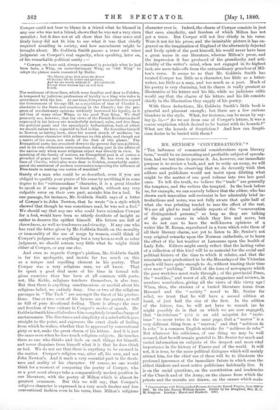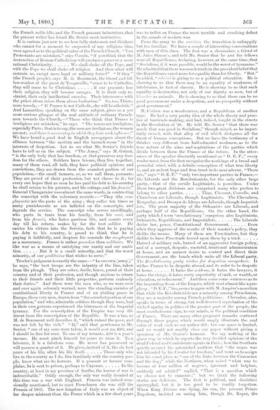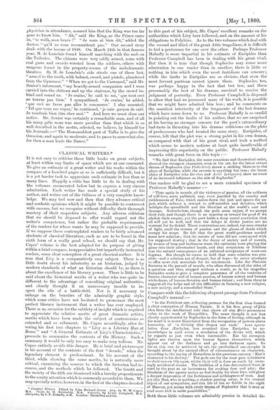MR. SENIOR'S " C ONVERSATIONS." *
"THE influence of commercial considerations upon literary form," would be an interesting and profitable subject of specula- tion, had we but time to pursue it. As, however, our immediate purpose is to review a book, and not to write an essay, we will confine ourselves to observing that we do devoutly wish that editors and publishers would not insist upon diluting what might be the matter of one good volume into two less good ones. To tell the truth, we believe the " trade " are generally the tempters, and the writers the tempted. In the book before us, for example, we can scarcely believe that the editor, who has shown such masculine self-restraint in her admirably brief in- troductions and notes, was not fully aware that quite half of what she was printing tended to mar the effect of the rest. We are all glad to read reliable reports of the "conversation of distinguished persons," so long as they are talking of the great events in which they live and move, but we do not care to have the well-known opinions of a writer like M. Renan, reproduced in a form which robs them of all their literary charm, nor yet to listen to Mr. Senior's not very original remarks upon the Norman cathedrals, or to learn the effect of the hot weather at Lausanne upon the health of Lady Erle. Editors might surely reflect that the lasting value of a collection of this kind will be as material for the social and political history of the time to which it relates, and. that the miserable men predestined to be the Macaulays of the Victorian epoch will have quite enough to do, without wasting their time over mere "padding." Think of the tons of newspapers which the poor wretches must wade through ; of the provincial Press, the "weeklies," and worst of all, the magazines and reviews, in numbers numberless, giving all the views of this viewy age ! When, then, the student of a buried literature turns from Hansard and the "society " novel to Mr. Senior for relief, we trust that he will have a second edition at hand, of just half the size of the first. In the edition of the future, too, he will not have to remark (as he might possibly do in that on which we are now engaged), that " incivicisme " (sic) is an odd misprint for " inciv- isme " to occur twice in the same page, that a " maron " is a very different thing from a " marron," and that "noblesse de la robe" is a common English mistake for "noblesse de robe." But whatever his criticisms, of one thing we may be well assured, that he will remain grateful to Mr. Senior for much and varied information on subjects of the deepest and most vital importance in the history of France and, of the world. It will not, it is true, be the more political dialogues which will mainly attract him, for the chief use of these will be to illustrate the profound ignorance of the immediate future in which even the ablest thinkers and most active politicians habitually live. It is on the social queetions, on the constitution and tendencies of the Church and of the Army, on the classes from which the _priests and the recruits are drawn, on the causes which make
* Conversations with Distinguished Persons during the Second Empire, from 1860 to 1863. By the late Masan William Senior. Edited by his Daughter, Mrs. M. C. M. Simpson. London : Hurst and Blacked. 1880.
the French noble idle, and the French peasant industrious, that the present writer has found Mr. Senior most instructive.
It is curious just now to see how fully statesmen and thinkers who cannot for a moment be suspected of any religious bias, were agreed as to the political value of the French Church. "You Protestants are mistaken,' 2 cries Cousin, "if you think that the destruction of Roman Catholicism will produce a purer or a more
rational Christianity We shall shake off the Pope, and with the Pope we shall shake off religion. And then what will restrain us, except mere legal or military force ?" "If they" (the French people), says M. de Beaumont, the friend and fel- low-worker of the great de Toequeville, "cease to be Catholics, they will cease to be Christians if our peasants lose their religion, they will become savages it is their only re-
straint, their only intellectual exercise. Their intercourse with the priest alone raises them above barbarism." So, too, Thiers, more tersely,—" If France is not Catholic, she will be atheistic." And Lamartine, speaking on the same subject, gives us a yet more curious glimpse of the real attitude of ordinary French- men towards the Church,—" Those who think that France is irreligious are mistaken," he says. "The towns are irreligious, especially Paris ; that is to say, the men are irreligious, the women are not; and there is no country in which they have such influen co." We have heard a good deal in English newspapers about the alliance between "the sacristy and the barrack-room" in the interests of despotism. Let us see what Mr. Senior's friends have to tell us on the subject. "The Army," says M. Guizot, "is the only body that has freedom, or that preserves any free- dom for the others. Soldiers have leisure, they live together, many of them read, all talk, they have political opinions and convictions, they are drawn from the soundest portion of our population,—the small farmers, or, as we call them, peasants. They are proud of their profession, but not slaves to it ; for every one hopes that as soon he has paid his debt to his country he shall return to his parents, and his cottage, and his fiancee." General Changarnier uses almost the same words, in contrasting the conscript with the voluntary recruits :—" They (the rem- placants) are the pests of the army ; they suffer ten times as many punishments as are inflicted on the conscripts, and degrade the service. The conscript who serves unwillingly, who parts in tears from his family, from his cure', and from his fiancée, who hates garrison life, and counts every day till his return, makes by far the best soldier. He carries his virtues into the Service, feels that he is paying his debt to his country, is proud to think that he is paying it faithfully, and despises his comrade the rempla cant as a mercenary. France is rather guerribre than militaire. We like war as a means of satisfying our vanity and our ambi- tion But it is a small minority, and that the worst minority, of our prolaaires that wishes to serve."
Trochu's judgment is exactly the same:—" In our own [army]," he says, "the best troops are the infantry of the line, taken from the plough. They are sober, docile, brave, proud of their country and of their profession, and though anxious to return to their friends and their little properties, perform zealously their duties." And these were the men who, as we were over and over again solemnly warned, were the standing enemies of contitutional liberty in France and of an abiding peace in Europe, these very men, drawn from "the soundest portion of our population," and who, admirable soldiers though they were, had in their own,persons experienced the bitterness of the Imperial tyranny. For the conscription of the Empire was very dif- ferent from the conscription of the Republic. It was a tax, us M. de Beaumont well describes it, "which ruined the poor, and was not felt by the rich." "If," said that gentleman to Mr. Senior, "one of my sons were taken, it would cost me £80, and I should be free for ever. To one of my tenants, £80 is a year's income. He must pinch himself for years to raise it. To a labourer, it is a fabulous sum. He never has possessed or will possess a quarter of it. He gives, instead of it, the six best
years of his life, often his life itself Those only who live in the country as I do, live familiarly with the country peo- ple, know what are its horrors. If a peasant or farmer com-
plains, he is sent to prison, perhaps to Cayenne In the country, at least in my province of Sarthe, the horror of war is indescribable." Oddly enough, the only war really dreaded at this time was a war with England. Prussia was indeed occa- sionally mentioned, but to most Frenchmen she was still the Prussia of 1805. The new kingdom of Italy was an object of far deeper mistrust than the Power which in a few short years
was to inflict on France the most terrible and crashing defeat in the annals of modern war.
From the army to the ouvricrs the transition is unhappily but too familiar. We have a couple of interesting conversations
with men of this class. The first was a shoemaker, a friend of M. Jules Simon's, and told Mr. Senior that he and his fellows were all Republicans, declaring, however, at the same time, that " Socialism, if it were possible, would be the worst of tyrannies."
He admitted that there was much truth in the prevalent belief that the Republicans cared more for equality than for liberty. "But."
he added, " celui-ci is giving to us a political education. He is
showing to us that there may be an equality of weakness, of intolerance, in fact of slavery. He is showing to us that such
equality is destructive, not only of our dignity as men, but of bien-arc as animals. He is showing to us that there can be no good government under a despotism, and no prosperity without good government."
M. Carbon was a wood-carver, and a Republican of another type. He had a very pretty idea of the whole theory and prac- tise of barricade-making, and had, indeed, fought in the streets in the Revolution of '48. He told Mr. Senior "that there was much that was good iu Socialism," though mixed, as he impar- tially owned, with that alloy of evil which disfigures all the finest of human conceptions. But we have the testimony of a thinker very different from half-educated workmen, as to time true nature of the aims and aspirations of the parties which divide between them the France of the future. In the utter- ances of the speaker discreetly mentioned as "D. E. F.," every reader must from the first recognise the workings of a broad and powerful mind, with a definite conception of what true liberty is, and an ardent hope and firm trust in its near advent. "There are," says "D. E. F." "only two important parties in France,— the Liberals and the Revolutionists, for the only other large party,—that of the servile Legitinaists, is powerless. Under these two great divisions are comprised ninny who profess to belong to other parties Thus, Circourt, Corcelle, and Chambrun are Liberals, though Legitimists. Time Chevaliers, Kergorlay, and Drouyu de Lhuys are Liberals, though Imperial- ists. The great majority of the Orleanists are Liberals, and perhaps half of the Republicans. On the other hand, the party which I term ' revolutionary ' comprises also Legitimists,.
Orleauists, Republicans, and Imperialists . The Liberals desire law, peace, Constitutional Government Even when they approve of the results of their master's policy, they dislike the means. Many of them are Free-traders, but they dislike to have Free-trade forced upon them by a trick Hatred of military rule, hatred of an aggressive foreign policy,. and of a corrupt, despotic, wasteful, irrational administration.
at home, and an earnest desire to control and direct their-
Government, are the bonds which unite all the Liberal party. The Revolutionary party wishes for despotism everywhere. It
wishes France to be despotic abroad, and its ruler to be despotic
at home It hates the noblesse, it hates the lawyers, it
hates the clergy, it hates every superiority of rank, or wealth, or education, or refinement." And then come some sentences as to the impending doom of the Empire, which read almost like a pro- phesy. "D. E. F.," too, seems to agree with M. Ampere's assertion that while time Revolutionists are a minority among Frenchmen, they are a majority among French politicians. Chevalier, also,. speaks in terms of strong, but well-deserved reprobation of the wicked apathy in polities of the greater part of the people, the most unwholesome sign, to our minds, in the political condition of France. There are many other pregnant remarks scattered through these pages, which would amply illustrate the real value of work such as our author did ; but our space is limited, and we would not readily close our paper without giving a specimen of Mr. Senior's humour. We say nothing of the grave way in which he reports the very decided opinions of the rival Federal and Confederate agents in Paris ; how the Southern quietly assured his astonished auditors that "time negro was not intended by his Creator for freedom," and went on to assign him his exact place as "one of the links between the Caucasian
and the dog ;" while the Northern, when asked "what was to become of four million of negroes, ignorant and helpless, suddenly set adrift?" replied, "'['hat is a question which
we choose not to examine ;" but we think the following stories are delicious. The first is political, and doubtless apocryphal, but it is too good to be readily forgotten. When King Jerinne was dying, his son, the present Prince Napoleon, insisted on seeing him, though Dr. Royer, the
physician in attendance, assured him that the King was too far gone to know him. " Ah," said the King, as the Prince came in, " te voilh, mon brave I" " Je vous ai hien dit," added the doctor, " qu'il ne vous reconnaitrait pas." Our second story deals with the heroes of 1848. On March 24th in that famous year, M. de Loruenie found himself marching with the mob on the Tuileries. The citizens were very oddly armed, some with real guns and swords wrested from the soldiers, others with weapons found in the property-rooms of the melodramatic theatres. By M. de Lornenie's side strode one of these last, "armed to the teeth, with helmet, sword, and pistols, plundered from the Gymnase." "When we got to the Carrousel," said Mr. Senior's informant, "my heavily-armed companion and I were carried into the château and up the staircase, by the crowd be- hind and round us. Je crams,' he said to me, que tout ceci ate tourne pas hien.' I sympathised. Je crams,' he added, que ceci ne fasse pas aller le commerce.' I also assented. Tel que vous me voyez,' he continued, je suis garcon de cafe. Je voudrais bien are chez moi.' " And here we must close our notice. Mr. Senior was certainly a remarkable man, and of all his many gifts none was more peculiar than that which is so well described in the motto, selected, we believe, by himself for his Journals :—" The Honourablest part of Talke is to give the Occasion, and again to moderate, and to passe to somewhat else, for then a man leads the Dance."




































 Previous page
Previous page